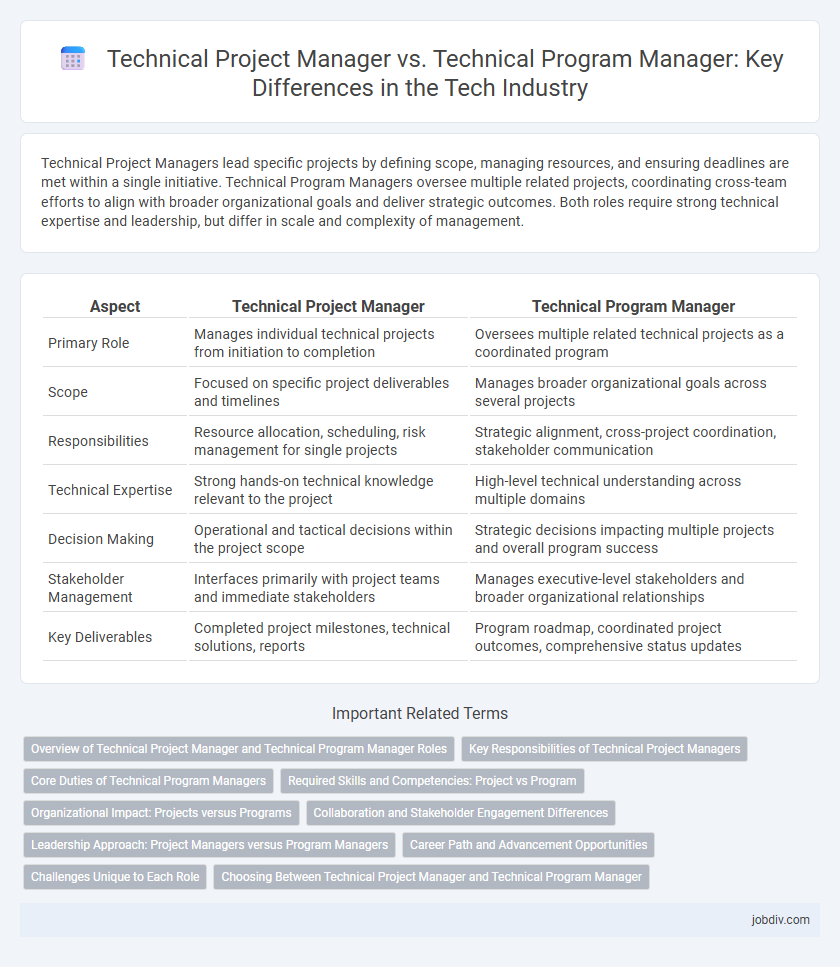Technical Project Managers lead specific projects by defining scope, managing resources, and ensuring deadlines are met within a single initiative. Technical Program Managers oversee multiple related projects, coordinating cross-team efforts to align with broader organizational goals and deliver strategic outcomes. Both roles require strong technical expertise and leadership, but differ in scale and complexity of management.
Table of Comparison
| Aspect | Technical Project Manager | Technical Program Manager |
|---|---|---|
| Primary Role | Manages individual technical projects from initiation to completion | Oversees multiple related technical projects as a coordinated program |
| Scope | Focused on specific project deliverables and timelines | Manages broader organizational goals across several projects |
| Responsibilities | Resource allocation, scheduling, risk management for single projects | Strategic alignment, cross-project coordination, stakeholder communication |
| Technical Expertise | Strong hands-on technical knowledge relevant to the project | High-level technical understanding across multiple domains |
| Decision Making | Operational and tactical decisions within the project scope | Strategic decisions impacting multiple projects and overall program success |
| Stakeholder Management | Interfaces primarily with project teams and immediate stakeholders | Manages executive-level stakeholders and broader organizational relationships |
| Key Deliverables | Completed project milestones, technical solutions, reports | Program roadmap, coordinated project outcomes, comprehensive status updates |
Overview of Technical Project Manager and Technical Program Manager Roles
Technical Project Managers focus on overseeing specific projects, managing timelines, resources, and deliverables to ensure successful completion within scope and budget. Technical Program Managers coordinate multiple related projects, aligning cross-functional teams and strategic goals to drive broader organizational initiatives. Both roles require strong leadership, technical expertise, and communication skills, but Technical Program Managers operate at a higher level of complexity and scale.
Key Responsibilities of Technical Project Managers
Technical Project Managers are responsible for planning, executing, and closing specific technical projects within defined timelines and budgets. They coordinate cross-functional teams, manage scope, mitigate risks, and ensure technical deliverables meet quality standards. Effective communication with stakeholders and clear task prioritization are crucial for aligning project objectives with business goals.
Core Duties of Technical Program Managers
Technical Program Managers (TPMs) oversee cross-functional initiatives that require coordinated efforts among multiple project teams, ensuring alignment with strategic business objectives. Their core duties include managing program scope, timelines, risks, and resources, while facilitating communication between stakeholders and technical teams. TPMs also focus on integrating various projects to deliver comprehensive solutions, optimizing processes, and driving continuous improvement across the program lifecycle.
Required Skills and Competencies: Project vs Program
Technical Project Managers require strong skills in scope management, detailed scheduling, risk identification, and stakeholder communication to deliver specific deliverables on time and within budget. Technical Program Managers need advanced competencies in strategic alignment, cross-project coordination, resource optimization, and change management to ensure multiple interconnected projects achieve overarching business goals. Both roles demand technical expertise and leadership, but program managers emphasize broader vision and integration, while project managers focus on execution precision.
Organizational Impact: Projects versus Programs
Technical Project Managers drive specific project execution, focusing on delivering defined scope, budget, and timeline within a single initiative. Technical Program Managers oversee multiple related projects, aligning them with strategic business goals to maximize long-term organizational impact and resource efficiency. While project managers emphasize tactical deliverables, program managers coordinate cross-functional teams to ensure program-level outcomes enhance organizational value.
Collaboration and Stakeholder Engagement Differences
Technical Project Managers focus on coordinating project-level tasks, ensuring team collaboration and timely delivery within defined scopes. Technical Program Managers oversee multiple related projects, facilitating broader stakeholder engagement and aligning cross-functional teams towards strategic goals. Their collaboration differs as Project Managers engage directly with project teams, while Program Managers interface with senior stakeholders to manage interdependencies and prioritize objectives.
Leadership Approach: Project Managers versus Program Managers
Technical Project Managers emphasize tactical leadership by directing individual project teams to achieve specific deliverables within scope, time, and budget constraints. Technical Program Managers adopt a strategic leadership approach, coordinating multiple related projects to align with broader organizational goals and ensuring cross-team collaboration. This distinction in leadership styles impacts stakeholder communication, risk management, and resource allocation across project and program lifecycles.
Career Path and Advancement Opportunities
Technical Project Managers focus on managing specific projects with defined scopes and timelines, advancing through roles like Senior Project Manager or PMO Director by honing expertise in project execution and resource coordination. Technical Program Managers oversee multiple related projects to achieve broader business objectives, with career progression often leading to Program Director or VP of Program Management roles due to their strategic planning and cross-functional leadership skills. Both paths offer advancement opportunities but differ in scope, with Technical Program Managers typically engaging in higher-level organizational strategy and complex stakeholder management.
Challenges Unique to Each Role
Technical Project Managers face challenges in managing project scope, timelines, and resource allocation to ensure successful delivery within constraints. Technical Program Managers tackle complexities of coordinating multiple interrelated projects, aligning diverse teams, and managing cross-functional dependencies for strategic outcomes. Both roles require advanced stakeholder communication skills, but Program Managers often contend with broader organizational impact and long-term vision execution.
Choosing Between Technical Project Manager and Technical Program Manager
Choosing between a Technical Project Manager and a Technical Program Manager depends on the scope and complexity of initiatives; a Technical Project Manager typically handles singular, well-defined projects with clear deadlines and deliverables, while a Technical Program Manager oversees multiple interconnected projects, ensuring strategic alignment and coordination across teams. Technical Program Managers focus on long-term goals and cross-functional dependencies, making them ideal for organizations managing large-scale transformations or continuous improvement pipelines. Evaluating organizational needs, project scale, and stakeholder involvement is critical to determine the appropriate role for optimal project governance and success.
Technical Project Manager vs Technical Program Manager Infographic

 jobdiv.com
jobdiv.com